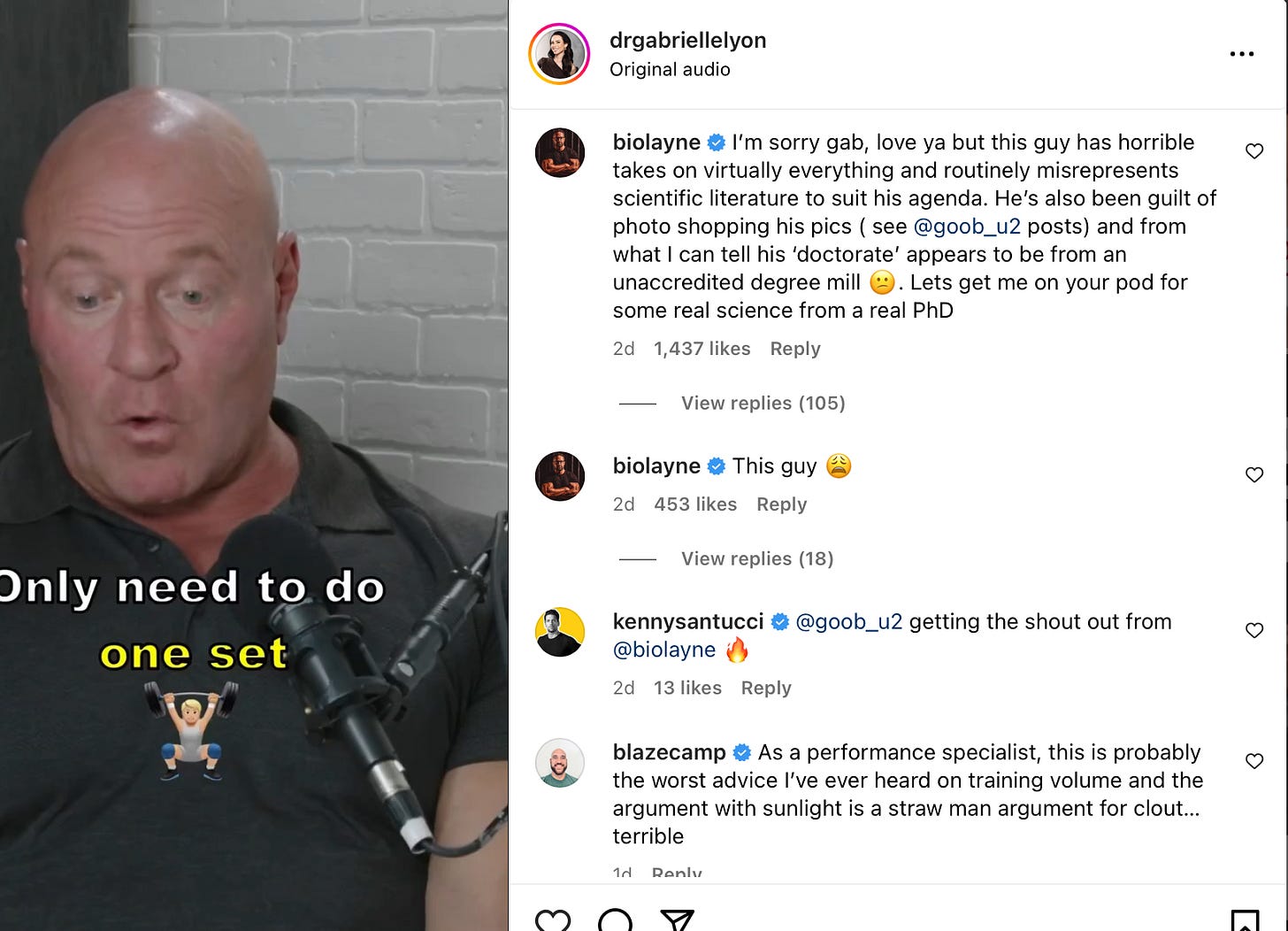Fitness “Influencers” and Podcast Propaganda
Misinformation is everywhere, but ESPECIALLY in Fitness.
Good Morning!
Misinformation is a growing concern in the world of health and fitness. With so many self-proclaimed experts offering their advice and opinions, it can be difficult to separate fact from fiction.
Today, I’m going to hone in on what I think are the two most prevalent sources of health misinformation — Fitness Influencers and Podcasts.
I say “Influencers,” as a broad stroke, because to say “social media” wouldn’t capture the whole scope — influencers have websites, apps, terribly written newsletters and might even appear on TV or in magazines if they play their cards right, as I noted in last week’s newsletter.
Podcasts themselves exist on platforms like Spotify and Apple Music, but the speed in which soundbites from podcasts spread via Instagram, Facebook, Youtube and Twitter without context is baffling.
On some of these platforms, the damage has already been done in droves — Fortune magazine recently studied 488 fitness “influencers” on Instagram and found that only 20% had legitimate credentials. Most of these bad actors are just good at gaming the algorithm.
But not all hope is lost.
TikTok, for it’s part — and it pains me to say this, because I have strong feelings about how TikTok operates as a platform — actually has some influential users who are fighting against fitness misinformation, as my colleague Oscar Gonzalez wrote in CNET.
Even Instagram, which gave rise to “Liver King” and countless other health gimmicks, has warriors like Mike Israetel, Layne Norton, and Derek Munro who actively dispel myths that float around the social media ecosystem.
I still think Instagram’s algorithm caters more to the controversial and flat-out wrong posts, and that maybe the platform is too saturated to be saved.
Fitness Free Speech and Podcast Propaganda
The issue with podcasts and fitness misinformation is that they often lack scientific backing. Many “experts” on acclaimed shows base their opinions and advice on anecdotal evidence or personal experience rather than rigorous research.
And when podcasters’ and their guests’ advice turns out to be incorrect or even harmful, it's impossible to tell how many cult followers have adopted their practice.
By now, we’ve seen the unfolding of Joe Rogan’s podcast (linked in the opening paragraph) as a harbor for anyone to position themselves as an authority in a given field.
Dr. Andrew Huberman was no more than six months into his Stanford tenure before his Rogan appearance, and has built an extremely well-known brand off of multiple appearances in front of his millions of viewers and listeners.
I’ll include my thoughts on Huberman later in the newsletter for paid subscribers, but he’s one example of someone whose stock price has skyrocketed in the attention economy a from a simple podcast appearance.
Huberman’s proposal of cold therapy as a means of muscle recovery on multiple podcasts (his own, Lex Fridman’s, and Rogan’s) led to people jumping into tubs of ice en masse.
While ice baths are a relatively benign health intervention to tout as universally effective (they aren’t), it reinforces the larger point of today’s newsletter: Any time anyone says one health intervention is universally effective, make sure you can backtest it with other qualified sources across the internet.
The evil twins of Huberman are characters like Vince Sant, or “V Shred,” who allegedly built followers and clout off of paid advertisements and clumsy showmanship. His desire to sell you his fitness programs runs so deep that he even created a fake version of Rogan’s signature burgundy curtain in his podcast room to give the illusion he was a guest on the show.
This is how prevalent the medium of podcasting has become: people will fake appearances on them just to prove their gravitas in a given industry.
“One Set is All You Need”
Dr. Gabrielle Lyon is a carnivore-centric functional medicine practitioner who gained a massive following over the past three years as Instagram users were divided by the tribalism that is carnivore versus vegan.
As a fierce proponent of meat for longevity, Lyon accrued followers at a rate that allowed her to monetize her platform in yet another way.
Ten months ago, Dr. Lyon released her first podcast, and as a fan of hers, I enjoyed quite a few episodes. She posted the best clips from her episodes to her Instagram feed, which the algorithm recognized I liked.
But this past Tuesday, she shared an atrocious post on her feed.
Whereas her past 10-12 posts have averaged a little over 100 comments, this one topped out at 950 comments, full of mostly pissed-off exercise physiologists.
In the clip, titled with the thumbnail, “Weightlifting is Lame,” her guest “Doctor” John Jaquish attempts to claim that weightlifting for more than one set is ineffective for building muscle.
Not only is this factually incorrect, but he spent most of the episodes indirectly selling his products, claiming everyone else in fitness is misleading, and hacking up a lung.
Also, it taints the title of “Ph.D” as something that might start to seem meaningless if someone like him can have one.
Usually this type of backlash might prompt someone to take an episode down or a post down, but Dr. Lyon has left it up, which makes me question why she would have someone spewing misinformation on her podcast.
The pessimist in me thinks that the post exists merely for clicks, likes and engagement. Which draws an eerie parallel to the phony influencers I mentioned at the top of the newsletter.
Dr. Lyon is accredited, smart, and sophisticated with how she delivers information. But she lost some of my respect for feeding into this vicious cycle of distrust that is online fitness.
It might be too much to ask fitness influencers and podcast propagandists to do better.
But as consumers, we should proceed from here with skepticism.






